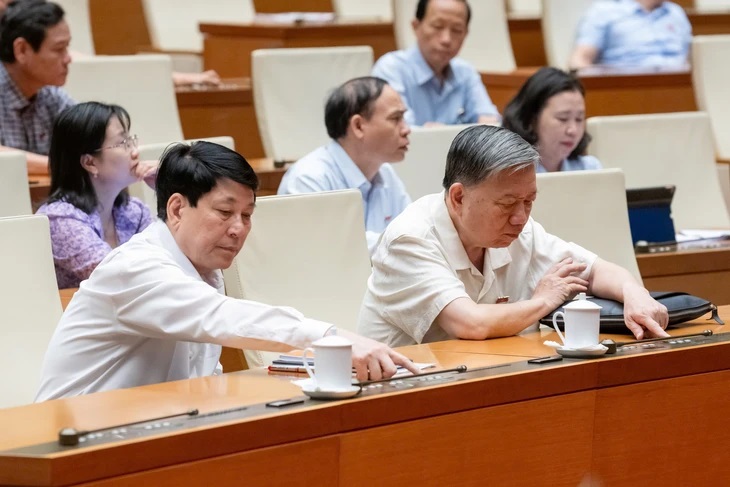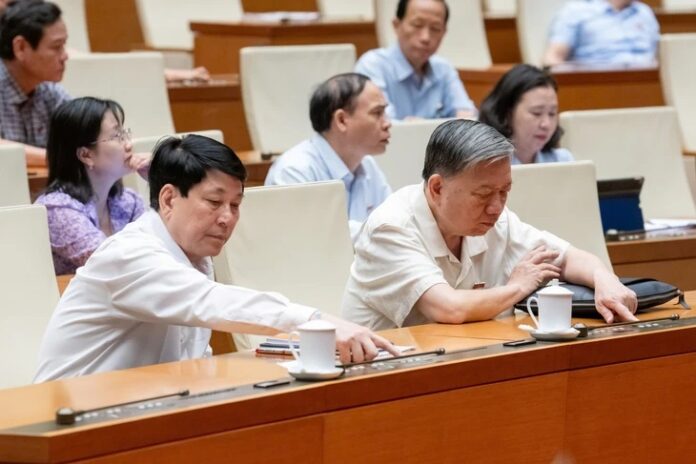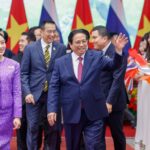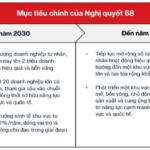In a move to boost the private economy, Vietnam’s National Assembly has passed a resolution with an overwhelming majority of 429 out of 434 delegates voting in favor. The resolution focuses on providing special mechanisms and policies to foster private economic growth.

National Assembly delegates have passed a resolution on special mechanisms and policies to develop the private economy
|
Tax exemptions and digital transformation support for small businesses and startups
The resolution includes a provision for a three-year exemption from corporate income tax for small and medium-sized enterprises, calculated from the date of their first registration certificate. Additionally, to encourage digital transformation among households, the government will provide free access to digital platforms and shared accounting software.
For innovative startup activities, the resolution grants a two-year tax exemption and a 50% reduction in taxable income for the following four years for startup businesses, venture capital fund management companies, and startup support organizations.
Furthermore, the resolution exempts personal and corporate income tax on income from the transfer of shares, capital contributions, and rights to purchase capital contributions in innovative startups. Experts and scientists working in startups and innovation hubs are also exempt from personal income tax for two years and receive a 50% reduction for the subsequent four years.
Interest rate support for green and circular projects
Private sector businesses, as well as business households and individuals, will receive a 2% annual interest rate subsidy when borrowing capital for green and circular projects that meet environmental, social, and governance (ESG) standards.
Limiting inspections to once a year
The resolution stipulates that each business, household, or individual entrepreneur will undergo a maximum of one inspection per year, including inter-sectoral inspections, unless there are clear signs of violations. These inspections must be conducted within the scope of authority and in a manner that avoids causing inconvenience or harassment. Any acts of exploiting inspections to create difficulties for businesses will be strictly handled.
Prioritizing economic and civil measures over criminalization of economic relations
The resolution emphasizes the clear distinction between the responsibility of legal entities and individuals, as well as between criminal, administrative, and civil liability. For civil and economic violations, economic and civil measures will be prioritized. In cases that may lead to criminal proceedings, such measures will only be considered when necessary and after evaluating proactive and timely economic remedies. This will serve as a basis for prosecution, investigation, and adjudication by judicial agencies.
The resolution also states that retroactive application of laws will not be used to the detriment of businesses, households, or individual entrepreneurs.
Guaranteeing the principle of presumption of innocence and minimizing investigation impact on production
When documents and evidence are inconclusive, the responsible agency must promptly reach a conclusion and make it public. The investigation, prosecution, and trial processes must uphold the principle of presumption of innocence. The seizure, attachment, and sealing of property must be proportionate to the anticipated damage and should not affect the normal operations of the business.
The resolution also mandates a clear distinction between legitimate assets and those related to violations, as well as between business assets and those of individuals in management when handling infractions.
– 12:46 05/17/2025
“Vietnam and Thailand Elevate Ties: Strategic Commitment, A New Leap Forward.”
On May 16, following the co-chairmanship of the 4th meeting of the Vietnam – Thailand Joint Cabinet, Prime Minister Pham Minh Chinh and his Thai counterpart, Paetongtarn Shinawatra, held a joint press conference. They announced that the two countries have officially elevated their relationship to a “Strategic Partnership.”
The Vice-Minister’s Directive: No Auction for Laos Cai’s Mineral Mine Licenses
“Vice Prime Minister Tran Hong Ha has recently signed a decision to add several mineral mines in Lao Cai province to the list of areas exempt from mineral exploitation right auctions, which fall under the authority of the Ministry of Agriculture and Environment to license.”
“How Did Pham Van Cach, Chairman of Son Lam Company, Bribe 71 Billion VND to Get His Drugs into Hospitals?”
“Bribery and corruption are prevalent issues in many societies, and Vietnam is no exception. In a recent scandal, Mr. Pham Van Cach was implicated in a bribery scheme, where he allegedly paid over VND 71 billion in bribes to facilitate the supply of medicines without hindrance. This shocking revelation has once again brought to light the deep-rooted corruption that plagues the nation and the lengths that some individuals will go to in order to achieve their nefarious goals.”
Unleashing Vietnam’s Private Sector: Vinacapital Expert Weighs in on Resolution 68
“The core vision of Resolution 68, according to the director of VinaCapital, is to foster a dynamic, robust, high-quality private economic sector with a global competitive edge. This resolution aims to empower private enterprises to become key drivers of Vietnam’s economic growth and transformation.”
Unveiling the Secrets Behind Over 500 Livestream Sessions of Vietnamese Products, Reaching 77,000 Orders and 1.2 Million Views
The power of live streaming has revolutionized the way Vietnamese agricultural products and goods are marketed, creating a powerful platform to build a strong national brand and foster sustainable economic growth.





















